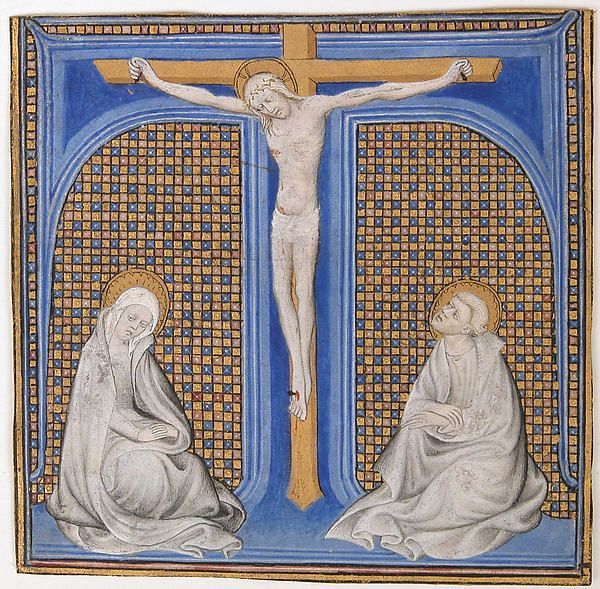Some Meditations have 2 options, you can choose any of them
Option A
Option B
Download.
Text
The Three Sins [045-053]
Usual Preparation Prayer.
First Prelude: The composition of Place: The representation will be to see in imagination my soul as a prisoner in this corruptible body, and to consider my whole composite being as an exile here on earth, cast out to live among brute beasts. I said my whole composite being, body and soul.
Second Prelude: The petition: Here the petition will be to ask for shame and confusion, because I see how many have been lost on account of a single mortal sin, and how many times I have deserved eternal damnation, because of the many grievous sins that I have committed.
Here Saint Ignatius asks us to call to mind three sins: that of the angels, that of Adam and Eve, and that of a soul condemned to hell for a single mortal sin. In each case, we’ll consider that sin, the effects, and then compare it to ourselves. We want to consider the destruction caused, and the devastation wrought, by one sin.
[050] The First Point: “This will consist in using the memory to recall the first sin, which was that of the angels, and then in applying the understanding by reasoning upon this sin, then the will by seeking to remember and understand all to be the more filled with shame and confusion when I compare the one sin of the angels with the many sins I have committed. I will consider that they went to hell for one sin, and the number of times I have deserved to be condemned forever because of my numerous sins.
I said we should apply the memory to the sin of the angels, that is, recalling that they were created in the state of grace, that they did not want to make use of the freedom God gave them to reverence and obey their Creator and Lord, and so falling into pride, were changed from grace to hatred of God, and cast out of heaven into hell.
So, too, the understanding is to be used to think over the matter more in detail, and then the will to rouse more deeply the emotions.”
Saint Peter tells us in his second letter that “God did not spare the angels when they sinned, but condemned them to the chains of Tartarus and handed them over to be kept for judgment” (2 Pt 2:4).
Let us consider the angels, created in paradise. As pure spirits, they don’t need matter for anything, so no food, no drink, no need to sleep, no need to rely on material things for knowledge. Their knowledge was wonderfully sublime, keen, and comprehensive; the energy of their will was proportioned to the loftiness of their intelligence. “The angelic intelligence is quite different from the human intelligence. . . . The angel does not receive its knowledge from things. Rather, ideas are poured into the angel by God. Man knows from the bottom up; an angel knows from the top down. We . . . have to unwrap the ideas that God put into things. An angel never has to wait until a package in unwrapped; it already knows what is in things. An angel is far more brilliant than man. An angel knows more science than Einstein. When an angel has an idea, for example, the idea of man, the angel knows every individual man in the world in virtue of that idea. Human being do not. We just know humanity in general.”[1]
In addition that that powerful intellect, and a will that was equally as powerful, their power outstripped that of the whole physical world. We can think of the angel who came to visit Gideon: “The angel of God said to Gideon, ‘Put the meat and the unleavened bread on that rock over there. Then pour the broth on them.’ And Gideon did as he was told. The angel of the Lord touched the meat and the bread with the end of the stick that was in his hand. Then fire jumped up from the rock and completely burned up the meat and the bread!” (Jdgs 6:20-21).
We can think of the power of the angel that killed Sennacherib’s army. In 2 Kgs 19:35, we read: “That night the angel of the LORD went forth and struck down one hundred and eighty-five thousand men in the Assyrian camp. Early the next morning, there they were, dead, all those corpses!” One night, 185,000 soldiers, without so much as a whimper or complaint, no resistance or fight.
Or at the Passover, in Ex 12:29, “And so at midnight the LORD[‘s angel] struck down every firstborn in the land of Egypt, from the firstborn of Pharaoh sitting on his throne to the firstborn of the prisoner in the dungeon, as well as all the firstborn of the animals.” In an instant, he kills the firstborn male everywhere in the entire nation.
Besides, from the first moment of their creation they had been endowed with sanctifying grace and adorned with various virtues, preeminently with charity. And what was their purpose, their destiny? The same as ours, to show reverence and obedience to their Lord and Creator. Hence they were unceasingly singing the praises of the Most High, rapt in loving adoration before the throne of His Majesty.
How did so many come to fall? What a tragic story! Saint Thomas Aquinas (ST, I, q. 63, aa. 1-3) tells us that the angels desired to be like God, but in a very specific way: they knew they couldn’t ever be equal to God, since their keen intelligence told them that only God is God. They wanted to be like Him, but through their own power. They didn’t want to receive what God had prepared for them as a gift.[2]
That’s all it took. From that moment, the moment when Lucifer said, “Non serviam – I will not serve,” he was cast into hell and was transformed. Lucifer, who, as Milton describes him, was “brighter once amidst the host. / Of angels, than that star the stars among, Fell with his flaming legions through the deep / Into his place” (Paradise Lost, VI, 131-135).
In this rebellion he was at once joined by numerous other Spirits. They refused to glorify their Creator, because they had become in love with themselves and inflated with pride. This sin was committed in the very presence of the Infinite Majesty. But that same instant, meaning, no delay, they also heard the awful sentence: “Depart from Me, you cursed, into everlasting fire.” No longer adopted Sons but degraded Rebels, they are stripped of sanctifying grace and supernatural virtue. Their beauty is changed into ugliness; just think of how this is portrayed in art, the image of an angel compared with an image of a demon. Their wisdom has become madness, their love is turned into hatred, and from Angels they are transformed into Demons. Driven from before the throne of God they are hurled into the abyss of Hell.
As often as I deliberately transgressed any Commandment of God in a grievous manner, I committed an act of rebellion similar to that of the Angels as to deserve no less a punishment than Hell. If the Angels were cast into Hell for one single sin, what have I not deserved for so many; especially after obtaining pardon, not only once, but over and over again, through the Blood of Jesus Christ, in the Sacrament of Penance? Where should I be most justly, at this very moment, except for the Inexhaustible Mercy of God? Instead of being allowed to live on this earth, a member of Holy Church, I have deserved, perhaps many times over, to be at the bottom of Hell, an object of scorn to the very Demons and the other Reprobates.
[051] The Second Point: In the same way the three powers of the soul are to be applied to the sin of Adam and Eve. Recall to memory how on account of this sin they did penance for so long a time, and the great corruption which came upon the human race that caused so many to be lost in hell.
I said recall to mind the second sin, that of our First Parents. After Adam had been created on the Plain of Damascus and placed in the Garden of Paradise, and Eve had been formed from his side, they sinned by violating the command not to eat of the tree of knowledge. Thereafter, they were clothed in garments of skin and cast out of Paradise. By their sin they lost original justice, and for the rest of their lives, lived without it in many labors and great penance.
So, too, the understanding is to be used to think over the matter in greater detail, and the will is to be used as explained above.
All the benefits that Adam had received were intended for one sole object, namely, that both Adam and Eve together with their entire offspring, by praising, revering, and serving God, might bring human nature to its highest perfection and complete in themselves the Divine likeness. Thus also this earthly Eden was but an entrance to the heavenly Jerusalem. How great God’s goodness, in giving them such a wonderful place! How great the graces they possessed, how their every need was met! And to think, as Genesis says, the “LORD God walk[ed] about in the garden at the breezy time of the day” (Gn 3:8).
To test the obedience of our First Parents, God had forbidden them to eat of the fruit of the tree of knowledge. We see at once how just this prohibition was easy but substantial. By respecting this kind command, Adam would have obtained, both for himself and for his posterity, the gift of sanctifying grace together with many other extraordinary favors. He was offered a choice between the fullness of life, natural as well as supernatural, and a miserable death of both body and soul; a choice between perfect happiness and utter affliction.
However, they did eat of the forbidden fruit and sinned. Lucifer, the leader of the fallen angels, appeared to them under the form of a serpent. He began by tempting Eve, in order through her also to seduce Adam. First he suggested to her imagination that the restriction put upon them by the Almighty was against their happiness; next he instilled into her heart a desire of becoming completely independent of the Most High; and then he drove her from this inward disloyalty into open disobedience. Eve in turn, by her bad example and insinuating manner, prevailed upon Adam to set aside the Divine Prohibition.
Their eating of the forbidden fruit, though in itself a very small thing, was nevertheless a deliberate and willful rejection of God’s Supreme Authority. Nor was the threatened penalty long in being inflicted: “Then the eyes of both of them were opened, and they knew that they were naked; so they sewed fig leaves together and made loincloths for themselves” (Gn 3:7). That same moment our First Parents were deprived of all their heavenly graces and special gifts; they were driven out of paradise into the wide world which thenceforth was to yield only thistles and thorns; and, filled with shame at the lustfulness of their bodies, they were obliged to cover them with the skins of animals. They too had decided to have their own way and to be their own masters, but they found that their flesh had revolted against their spirit and that the whole earth had shaken off their former supremacy. Before, everything in them was subjected to God: their intellects and wills had perfect control over their passions and lower faculties, and these, in turn, had control over everything in the created world. Man was the ruler of all reality. Now, all that was turned upside down.
The remainder of their lives was spent in constant and manifold misery, which finally culminated in the terrible ordeal of death. Yet all these sufferings would have availed them nothing to escape eternal perdition, had it not been for the infinite merits of their promised Redeemer. But even so, what terrible consequences this one sin entailed for all their descendants: loss of sanctifying grace and other precious gifts; darkness of the mind and weakness of the will; subjection of the soul to a threefold concupiscence; numberless hardships and ailments of the body rapidly preparing the way for death.
What dire consequences, and all this for one small sin, one little act of disobedience! It was a small thing, and yet how much suffering and destruction it has brought the world! How many souls have suffered the consequences of this one little decision! What do I deserve, then, for my many grave sins, for my many acts of disobedience! What should the consequences of my many mortal sins be?
Adam and Eve were given all the goods of the earth, all the created reality, to serve God. However, they used a creature to do their own will and to act against God. See the destruction and the disorder that results! And me, and my life . . . how many times I have abused, not one, but many creatures! How much disorder and destruction has resulted from my sins!
[052] Third Point: In like manner, we are to do the same with regard to the third sin, namely, that of one who went to hell because of one mortal sin. Consider also countless others who have been lost for fewer sins than I have committed.
I said to do the same for the third particular sin. Recall to memory the gravity and malice of sin against our Creator and Lord. Use the understanding to consider that because of sin, and of acting against the Infinite Goodness, one is justly condemned forever. Close with the acts of the will as we have said above.
The third sin to be considered is a still more striking instance of Divine Justice; namely, the loss of “a soul who for one mortal sin has gone to Hell, and of many others without number that have been condemned for fewer sins than I committed.” And yet I am still alive.
St. Alphonsus Ligouri gives the example of a little boy, just barely the age of reason, who, when passing in front of a church where Alponsus stood, uttered a blasphemy. At that very moment, he fell down, dead. But, who will say that God was unjust in such a case? Who would say that the boy didn’t deserve such a punishment, or that God was harsh?
As God says through the prophet Ezekiel: “You say, ‘The LORD’s way is not fair!’ Hear now, house of Israel: Is it my way that is unfair? Are not your ways unfair? When the just turn away from justice to do evil and die, on account of the evil they did they must die. . . . But the house of Israel says, ‘The Lord’s way is not fair!’ Is it my way that is not fair, house of Israel? Is it not your ways that are not fair?” (Ez 18:25-29).
In the light of this fact that so many are lost for one single sin, how silly appears the presumption that it is easy to avoid Hell after committing a grievous offense, and what utter folly it was for me to remain so long on the brink of perdition or even within the reach of temptation. Where should I be now, if God had wished to deal with me as He most justly dealt with countless other sinners perhaps far less guilty than myself? If God had treated me as was only right and just, I should long since have been a prisoner in Hell, abandoned to perpetual torment and infamy.
[053] Colloquy: Imagine Christ our Lord present before you upon the cross, and begin to speak with him, asking how it is that though He is the Creator, He has stooped to become man, and to pass from eternal life to death here in time, that thus He might die for our sins.
I shall also reflect upon myself and ask:
“What have I done for Christ?”
“What am I doing for Christ?”
“What ought I to do for Christ?”
As I behold Christ in this plight, nailed to the cross, I shall ponder upon what presents itself to my mind.
[1] Fulton J. Sheen, Thinking Life Through (New York: McGraw-Hill, 1955), 29-30.
[2] Summary given at http://readingthesumma.blogspot.com/2012/03/question-63-sin-of-angels.html

Take, Lord,
and receive all my liberty, my memory, my understanding, and my entire will, all that I have and possess. Thou hast given all to me. To Thee, O Lord, I return it. All is Thine, dispose of it wholly according to Thy will. Give me Thy love and Thy grace, for this is sufficient for me.
(Spiritual Exercises #234. Louis Puhl SJ, Translation.)



